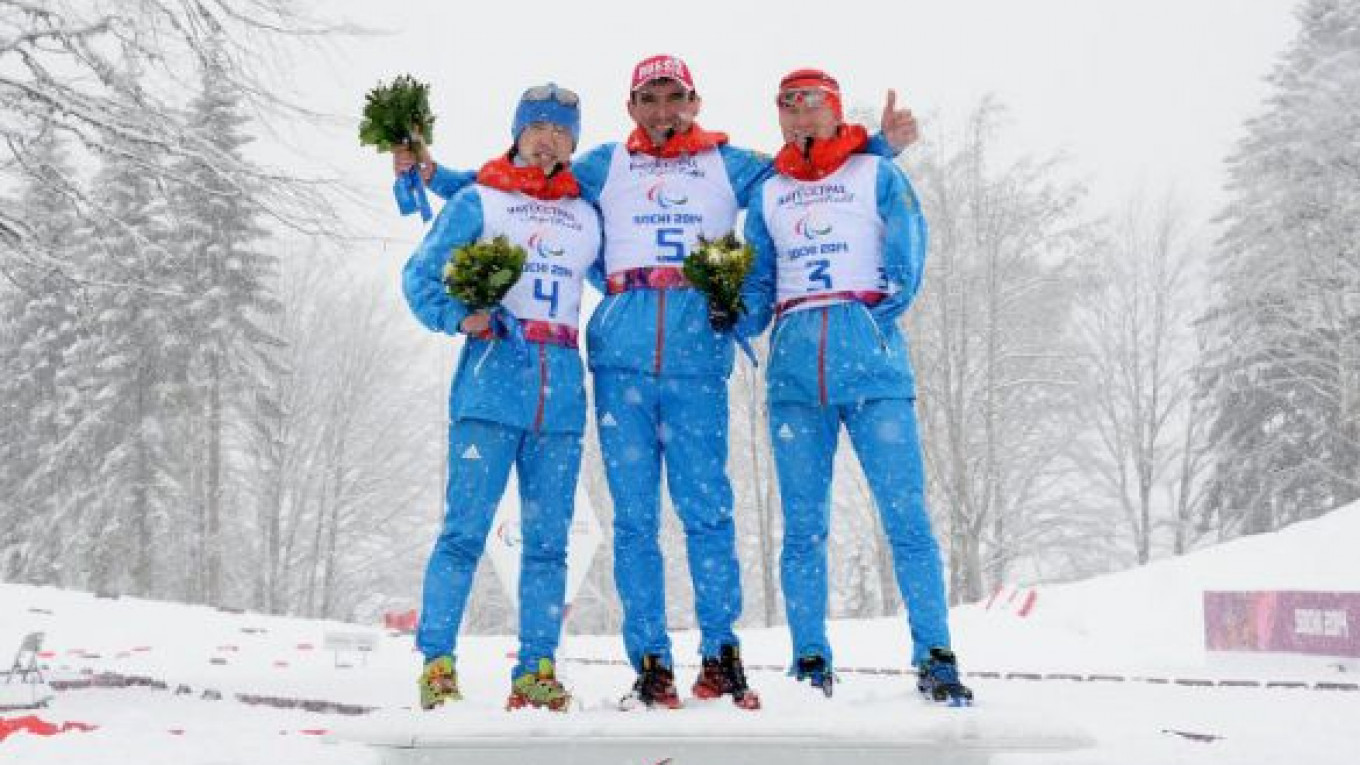KRASNAYA POLYANA — Russia beat its record Winter Paralympic medal haul at the Sochi Games on Wednesday while claiming 10 of 18 medals on offer in the cross-country skiing one-kilometer sprints.
Meanwhile, Canada's Brian McKeever won his ninth career Paralympic gold medal, and Russian-born US athlete Tatyana McFadden, a star of the Summer Paralympics as a wheelchair racer, claimed her first medal in winter sport.
Following the sprints, host nation Russia has a total medal haul of 46, eight more than its previous Winter Paralympic best from Vancouver 2010. Sixteen of those are gold medals, ensuring Russia leads the medal table, with second-placed Germany on six golds.
Russia has dominated cross-country skiing throughout the Paralympics to date and that was typified in the men's standing sprint, where the six men in the final were all Russians.
Kirill Mikhailov raced to victory in 3 minutes 53.5 seconds, beating 20-kilometer gold medalist Rushan Minnegulov by just 0.3 seconds.
Vladislav Lekomtsev, 19, finished third to win his third medal of the Games, following his victory in the 7.5-kilometer biathlon event and bronze in the 20-kilometer cross-country. Those three medals ensured Russia beat its Vancouver tally of 38 and its record of 13 gold medals from Turin 2006.
McKeever, 34, and his guide Graham Nishikawa dominated their rivals in the men's visually impaired category, claiming his ninth career gold and second of the Sochi Paralympics after victory in the men's 20-kilometer race two days before.
McKeever won in 3 minutes 59.6 seconds to beat Swedish youngster Sebastian Modin, 19, into second place by 1.8 seconds. The bronze medal went to Russia's Oleg Ponomaryov, a further 3.6 seconds down.
Earlier, McFadden missed out on gold in the women's sitting event by just 0.1 seconds but still celebrated wildly, while Norway's Mariann Marthinsen claimed the gold in 2 minutes 45.6 seconds. Bronze went to Germany's Andrea Eskau, 0.8 seconds further back. U.S. medal hope Oksana Masters briefly led, but faded and finished fifth.
Russian Paralympic star Roman Petushkov became the first athlete at the Sochi Paralympics to win four gold medal after winning the sitting sprint race. The 36-year-old, who earlier won two biathlon races and the 15-kilometer skiing event, managed to overcome his younger compatriot Grigory Murygin by just 1.2 seconds, winning in a time of 2 minutes 29.4 seconds.
It is the second medal for the 19-year-old Murygin, who also took bronze in the 12.5-kilometer biathlon competition. The bronze went to Ukraine's Maksym Yarovyi, who added the medal to his silver in the 7.5-kilometer biathlon.
There was more success for Russia in the women's standing sprint, where Anna Milenina took gold in a time of 4 minutes 26.9 seconds, winning by 4.5 seconds from Ukraine's Iuliia Batenkova, with third place for Russian Alyona Kaufman, 0.3 seconds further back.
The women's visually impaired final brought Russia yet another gold medal as Mikhalina Lysova claimed her third gold medal of the Games with her guide Alexei Ivanov, winning in a time of 4 minutes 11.5 seconds.
The silver went to Russian Yelena Remizova, 5.6 seconds behind, with Ukrainian bronze medalist Oksana Shyshkova finishing 13.1 seconds back to stop a Russian podium sweep as host nation athlete Yulia Budaleyeva trailed in fourth.
In cross-country sprints at the Paralympics, skiers with more severe disabilities are given head starts over their more mobile opponents.
A Message from The Moscow Times:
Dear readers,
We are facing unprecedented challenges. Russia's Prosecutor General's Office has designated The Moscow Times as an "undesirable" organization, criminalizing our work and putting our staff at risk of prosecution. This follows our earlier unjust labeling as a "foreign agent."
These actions are direct attempts to silence independent journalism in Russia. The authorities claim our work "discredits the decisions of the Russian leadership." We see things differently: we strive to provide accurate, unbiased reporting on Russia.
We, the journalists of The Moscow Times, refuse to be silenced. But to continue our work, we need your help.
Your support, no matter how small, makes a world of difference. If you can, please support us monthly starting from just $2. It's quick to set up, and every contribution makes a significant impact.
By supporting The Moscow Times, you're defending open, independent journalism in the face of repression. Thank you for standing with us.
Remind me later.






